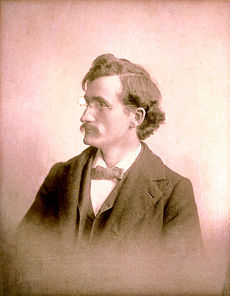Liberty Hyde Bailey
Liberty Hyde Bailey (1858-1954) was an American horticulturist, botanist and co-founder of the American Society for Horticultural Science. Born in South Haven, Michigan, he was educated and taught at the Michigan Agricultural College (now Michigan State University) before moving to Cornell University in Ithaca, New York, where he became dean of the Cornell University College of Agriculture and Life Sciences. He edited The Cyclopedia of American Agriculture (1907-09), the Cyclopedia of American Horticulture (1900-02), and the Rural Science, Rural Textbook, Gardencraft, and Young Folks Library series of manuals. He wrote scores of books, including scientific works, efforts to explain botany to laypeople, a collection of poetry, and coined the word cultivar. Cornell University memorialized Bailey in 1912 when Bailey Hall the largest building on campus was dedicated in his honor.
Bailey is credited with being instrumental in starting agricultural extension services, the 4-H movement, the nature study movement, parcel post and rural electrification. He was considered the father of rural sociology and rural journalism.
About 140 years after his birth, the Liberty Hyde Bailey Scholars Program was created at Michigan State University, the institute of higher learning where Bailey began his career. The Bailey Scholars Program incorporates L.H. Bailey's love of learning and countless expressive learning styles to provide a safe, nurturing space for students to become educated in fields that interest them. The credo of the group is: "The Bailey Scholars Program seeks to be a community of scholars dedicated to lifelong learning. All members of the community work toward providing a respectful trusting environment where we acknowledge our interdependence and encourage personal growth."[1]
Biography
Bailey's father, Liberty Hyde Bailey, Sr. moved to southern Michigan in 1842, and married Sarah Harrison in 1845. Liberty Hyde, Jr., was their third son, born in 1858. The pioneer family worked hard clearing woods, building a farm and planting an orchard, and produced much of their own food and clothing. They earned income primarily from butter, eggs, maple sugar, and wood, and Bailey Sr. worked off the farm to earn additional money for farm improvements. In 1854, they moved to South Haven at the mouth of the Black River, settling on a plot of land with good fruit growing potential. Sarah never recovered from the death of her eldest son in 1861; she died of scarlet fever in 1862. Bailey Sr. then married a young farm woman, Maria Bridges.
The Baileys were skillful and innovative farmers, and their farm became known for its prize-winning apple orchards. Father and son belonged to the newly organized South Haven Pomological Society. One of their orchards won a first premium as a model orchard, perfect in "culture, pruning, and fruitfulness." Eventually the orchards included over 300 cultivars. Young Liberty became an expert on grafting; his skills were in great demand among his neighbors.
Liberty Hyde Bailey was educated in the local school, where his teacher, Julia Fields, taught him grammar, geometry, and Latin, and encouraged his interest in nature. He was also influenced by the books his father bought, including the Bible, Pilgrim’s Progress, Milton’s poems, and especially, Charles Darwin’s On the Origin of Species and Asa Gray’s Field, Forest, and Garden Botany.
Some selected works
- The Principles of Fruit-Growing (1897)
- The Nursery Book (1897)
- Plant-Breeding (1897)
- The Pruning Manual (1898)
- Sketch of the Evolution of our Native Fruits (1898)
- Principles of Agriculture (1898)
- The Principles of Vegetable Gardening (1901)
- The State and the Farmer (1908)
- The Nature Study Idea (1909)
- The Training of Farmers (1909)
- Manual of Gardening (1910)
- The Outlook to Nature (1911)
- The Country Life Movement (1911)
- The Practical Garden Book (1913)
Notes
- ↑ The Bailey Scholars Program Retrieved November 17, 2007.
ReferencesISBN links support NWE through referral fees
- Dorf, Philip. Liberty Hyde Bailey; An Informal Biography. Ithaca, N.Y.: Cornell University Press, 1956. OCLC 814238
- Fairchild, David. Liberty Hyde Bailey. 1941 OCLC 6832997
- Rodgers, Andrew Denny. Liberty Hyde Bailey; A Story of American Plant Sciences. Princeton: Princeton Univ. Press, 1949. OCLC 630334
External links
- Liberty Hyde Bailey, A Man for all Seasons Retrieved November 16, 2007.
- Works by Liberty Hyde Bailey. Project Gutenberg Retrieved November 16, 2007.
Credits
New World Encyclopedia writers and editors rewrote and completed the Wikipedia article in accordance with New World Encyclopedia standards. This article abides by terms of the Creative Commons CC-by-sa 3.0 License (CC-by-sa), which may be used and disseminated with proper attribution. Credit is due under the terms of this license that can reference both the New World Encyclopedia contributors and the selfless volunteer contributors of the Wikimedia Foundation. To cite this article click here for a list of acceptable citing formats.The history of earlier contributions by wikipedians is accessible to researchers here:
The history of this article since it was imported to New World Encyclopedia:
Note: Some restrictions may apply to use of individual images which are separately licensed.
